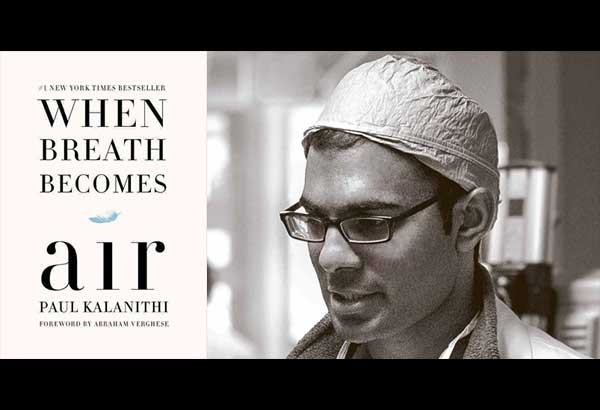Terminal velocity

Paul Kalanithi
WHEN BREATH BECOMES AIR
By Paul Kalanithi
243 pages
Available at National Book Stores
Perhaps there are only two points in life when things come into sharpest focus: at moments when we actually realize that we are alive — moments of ecstatic joy, the experience of watching another life come into the world, or sharing what it means to be alive for another person. The moment when things feel so fleeting and so eternal at the same time. That’s what we seek: the collapse of time into one expanded moment that reminds us of eternity.
And of course, the other moment when things come into sharpest focus is when we realize that, one day, we will actually die: actually stop breathing, actually draw a final breath.
When resident neurosurgeon Paul Kalanithi learns that he has stage IV lung cancer at age 36, it flips the script of his life. A lit and philosophy major before becoming a doctor, he had so many plans: to be a brilliant surgeon, to have a family with wife Lucy, and to find the language to communicate the meaning of life.
Then suddenly, he’s no longer the one trying to guide families through bad news; suddenly he has to grapple with how to function with precious few days of life left.
In his short memoir When Breath Becomes Air, Kalanithi achieves one of his aims: to put into words many of life’s richest experiences, death among them. In the short list of brief memoirs about time fading away such as The Diving Bell and the Butterfly or Tuesdays With Morrie, Kalanithi’s account benefits from a wrenching anguish — a sense of life’s sands sifting away too quickly — that comes through in his language, but also because we come to share his concerns and dreams. There’s a moment of brief remission (following chemotherapy) in which Paul sits with his female doctor and listens to his options. His mind is already on the horizon, the probabilities and odds stacked against him, but he hears her blurt out, “You have five good years left.” It’s a moment, he realizes, meant to console her as much as Paul: “Doctors, it turns out, need hope, too.”
The first half of When Breath Becomes Air shows us the challenge of becoming not only a doctor, but a neurosurgeon, and it gives us renewed respect for their journey. It also opens up questions for Paul about how to best prepare patients and families for the truth, and the bigger questions about what actually lies beyond death. “In these moments, I acted not, as I often did, as death’s enemy, but as its ambassador,” he writes. Paul must convey to loved ones that the person they knew and loved now lives in the past; they have to learn to accept what’s to come. He’s like a mythological figure leading the living through the underworld. Perhaps only in retrospect, in writing this memoir, does he realize “how little do doctors understand the hells through which we put patients.”
After the diagnosis, Kalanithi does something unusual: he goes back to work. He delays chemo and continues his OR residency, finally graduating to become a full doctor, though it physically wastes him. So another goal is achieved.
But cancer is not a cheering section. It comes back, and Paul goes from doctor to patient, from actor to acted upon. One thing people who know doctors agree upon is that they make the worst patients. Kalanithi has to endure a resident who won’t take his advice on changing his pain medicine; it would require a late-night call to the attending physician, and the resident doesn’t like being second-guessed by a dying man. (You can imagine the restraint it takes for Kalanithi not to wring his neck.)
As a lit major, it’s not surprising that Kalanithi looks to the great writers to express what death portends. Given his death sentence, he pores over Solzhenitsyn, Tolstoy, Woolf, Frost. Their insights help him carve out his own understanding of what awaits him. T.S. Eliot makes a frequent appearance, as when he recites poetry on video for daughter Cady to listen to after he’s gone; or when he recalls Samuel Beckett’s dualistic final words from The Unnameable: “I can’t go on. I’ll go on.”
There’s everything about endurance in those seven short words, and this reading is fuel and food for Kalanithi in his battle.
With a supportive wife by his side — and eventually the blessing of a newborn daughter — Paul taps out paragraphs in his moments of strength. It’s the final eight months of life when this memoir comes together, a reflection on what it means to be alive, and to be alive only in the memories of others.
On his last day in the OR, he puts on the radio to hear the soft bossanova of Stan Getz/Joao Gilberto (something he long dreamed of playing while in surgery, instead of the classic rock most surgeons loved) and thinks about bringing home all his scrubs and books and accumulated office data, but thinks better of it: he’ll leave behind the books; someone could use them.














